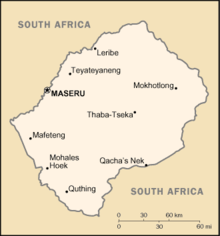1970 Lesotho coup d'état
 | |
| Date | 30 January 1970 |
|---|---|
| Location | |
| Type | Self-coup |
| Cause | Electoral defeat of the ruling BNP in the general election |
| Motive | Annulment of the general election |
| Organised by | Leabua Jonathan |
| Participants | Government of Lesotho |
| Outcome | Coup succeeds
|
The 1970 Lesotho coup d'état was a self-coup that took place in Lesotho on 30 January 1970, led by Prime Minister Leabua Jonathan.[1] It led to the assumption of dictatorial powers by Prime Minister Jonathan, who held the office since 1965. The coup was triggered by the victory of the opposition Basutoland Congress Party (BCP, led by Ntsu Mokhehle) over the ruling Basotholand National Party (BNP, led by Jonathan) in the general election.[2]
Prime Minister Jonathan declared a state of emergency, annulled the election, dissolved parliament and suspended the constitution.[3] King Moshoeshoe II was sent into exile after expressing disapproval of the actions.[2] Jonathan himself was deposed in the 1986 coup d'état, led by General Justin Lekhanya.[4]
References
- ^ Peter Hawthorne (12 February 1970). "Business Returning to Normal in Lesotho After Coup". The New York Times. Retrieved 7 January 2019.
- ^ a b "30 janvier 1970: Renversement du gouvernement et exil du roi Moshoeshoe II au Lesotho" (in French). Perspective monde.
- ^ Lesotho: Authoritarian rule, 1970–1991 EISA
- ^ Alan Cowell (21 January 1986). "MILITARY TOPPLES LESOTHO LEADER; CAPITAL JUBILANT". The New York Times. Retrieved 13 January 2022.

